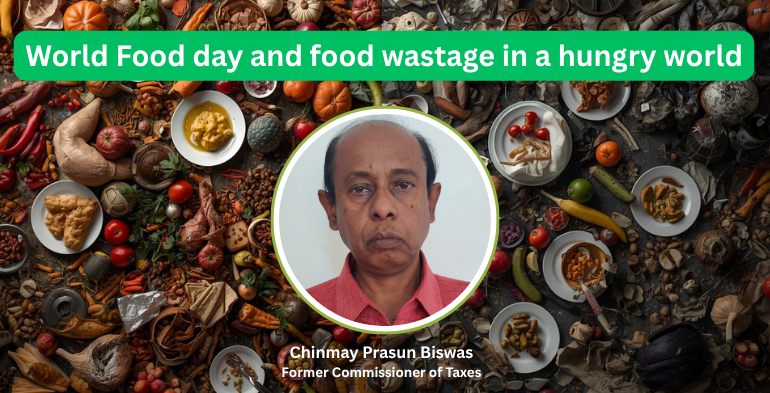
Chinmay Prasun Biswas: Food is the first basic need of human beings. Food items are basically agricultural products. But this first need remains unfulfilled for crores of people in the world. The FAO (Food and Agriculture Organization was established on 16th October, 1945. The primary purpose was to accumulate international efforts to combat hunger and poverty but number of hungry people is increasing day by day.
World Food Day is observed on 16th October. For 2025 theme is - Right to foods for a better life and a better future. This theme highlights the importance of ensuring food security and nourishing lives. Despite production of enough food, hunger continues due to unscrupulous wastage of food in many countries of the world.
Hunger knows no law. It burns everything. In his poem আমার ্কৈফিয়ত Kazi Nazrul Islam has rightly written -
ক্ষুধাতুর শিশু চায় না স্বরাজ চায় দুটো ভাত একটু নুন
বেলা বয়ে যায়, খায়নি কো বাছা কচি পেটে তার জ্বলে আগুন।
Burning the belly is not the end. Thousands of people are waiting for food and dying for want of food in Gaza.
In 2024, about 2.3 billion people faced moderate or severe hunger while 733 million faced hunger in 2023. Food insecurity particularly prevailed high in Africa where nearly 29% of the population were hungry in 2023. A report of the United Nations in July, 2025 shows that around 673 million people faced hunger in 2024, still above pre-pandemic level. Though global position has improved a little, hunger continues to rise in Western Asia, South Asia and Latin America.
Racing with hunger wastage of food is continuing unharnessed. According to a report of United Nations Environment Programme of 27-3-2024, households all over the world wasted over 1 billion meals a day in 2022 while 1/3rd of world population remained hungry. Around 19% of food is wasted globally whereas 783 million people suffer from chronic hunger.
Referring to a report of the United Nations the Bangladesh Pratidin mentioned on 18-9-2023 that 700 million in the world are not certain of getting their next meal. According to a report of the World Food Programme, one of every 10 go to bed hungry every night. The World Food Programme informed Security Council that due to a lack of donations food ration had to be continuously curtailed.
Quoting FAO the Deutsche Welle reported that every year at least 1/3rd of total food produced is wasted. As reported by BBC Bangla on 8th June, 2022, due to wastage at harvesting level a large portion of the food produced each year do not reach the plate.
According to advocate of the United Nations Environment Programme, around 1.3 billion tons of food are wasted around the world every year (the Business Standard dt. 15-01-2024). As reported by the United Nations Food Waste Programme, 50% of total food waste occurs in Saudi Arabia. According to a 2023 study of the Saudi Grains Agency, 4.06 million tons (equivalent to 33.1% of production) of food is wasted there every year. An average person wastes about 184 kgs of food a year. The country wastes more than 3,35,000 tons of vegetables. Yearly food waste in Saudi Arabia costs 40 billion Saudi riyals.
In a report on Food Waste Index of 2021 the United Nations Environment Programme stated that 16 million tons of food is wasted in Bangladesh every year. According to the UNEP index, a Bangladeshi wastes 65 kgs of food every year. More than 2 crore 10 lakhs tons of food, including rice, is wasted every year. If cost of wasted fine and coarse rice is calculated at an average of Tk 50/- per kg, the cost is Tk 40,430 crores. On the other hand, although self-sufficiency in rice production was firmly claimed and widely publicised by previous government, an average of 30-35 lakh m/tons of rice, costing more than 100 crore dollars, were imported every year which still continues.
According to the latest Food Waste Index Report of the United Nations Environment Programme in March, 2024, a Bangladeshi wastes 82 kgs of food yearly at home. It is much higher than that in rich countries like the United States (73 kgs), Netherlands (59 kgs) and Japan (60 kgs). Every year 14.10 million tons of food is wasted by households in Bangladesh. This sad state of food wastage has worsened in comparison to earlier estimate of 65 kgs annually.
Households in Bhutan waste 19 kgs of food per person yearly. It is the lowest among South Asian countries followed by India (55 kgs), Sri Lanka (76 kgs) and Bangladesh (82 kgs). The Maldives households waste 207 kgs of food per person every year, the highest in this region followed by Pakistan (130 kgs), Afghanistan (127 kgs) and Nepal (93 kgs). As mentioned in that report, food waste is not just a rich country problem. It occurs everywhere, only the quantity differs.
Around fourteen crore people in Bangladesh live in rural areas. It has been noticed that food waste does not occur in rural areas. In fact, even during occasional programmes and celebrations, the unconsumed food is distributed among the poor. Nothing is allowed to waste. This is a good practice.
According to UN estimates, the world's population will reach 950 billion by 2065.More food will be required to feed this huge population. Experts believe that this problem can be solved only by stopping food waste. It is possible to increase the effectiveness of the entire cycle by increasing the use of technology in agriculture, improving conservation system, enhancing investment and training farmers to prevent wastage.
Away from such appalling picture of hunger and food wastage, experts have provided different suggestions so that grain from ground can reach al burning bellies. This will reduce waste by pre-planning shopping, cooking and serving. The suggestions include - not to buy more than need and storing properly at home. Due to ignorance to preserve vegetables and fruits, those turn inedible quickly. Learning the way to save surplus food, instead of throwing away, is necessary. Organic fertiliser can be prepared at home with fruits or vegetable peels, leftover food. These suggestions are not much costly, nor troublesome, nor time-consuming. Just a little caution and care is sufficient.
The writer is a former Commissioner of Taxes
























